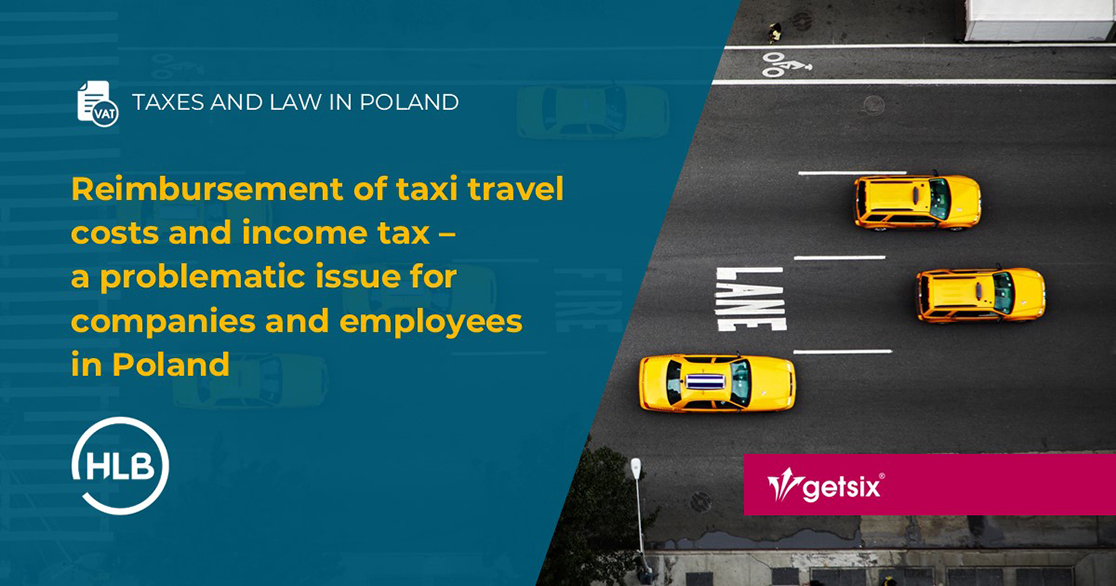Reimbursement of taxi travel costs and income tax – a problematic issue for companies and employees in Poland – judgment of the Supreme Administrative Court of Poland (NSA)
5 February 2025
5 February 2025

Many businesses reimburse their employees for taxi travel expenses to optimize operational efficiency and ensure the effective performance of professional duties. However, according to a judgement of the Supreme Administrative Court of Poland (in Polish: Naczelny Sąd Administracyjny, NSA) of November 19, 2024 (case no. II FSK 230/22), such reimbursement may be considered as taxable income for employees.
The subject of the case concerned a teaching hospital in Poland that reimbursed its employees for taxi fares in the course of carrying out business trips. In particular, this concerned the transport of transplant materials, requiring fast and safe transportation.
The hospital argued that in many cases, using public transportation was either impossible or too time-consuming, which could result in the loss of transplant materials. The hospital emphasized that transport takes place in the early morning, late evening and even at night, and that returning at night could pose a safety risk to staff.
Employees were reimbursed for taxi fares from train stations or airports to their business premises or home. The request also specifies that business taxi journeys relate to meetings with contractors and offices and institutions such as the National Health Fund (in Polish: NFZ), tax office, Social Insurance Institution (in Polish: ZUS) or banks. Reimbursements were also provided for domestic and international business trips. Occasionally, the hospital director or deputy director also used taxis for business purposes.
The hospital sought clarification from the National Tax Administration (in Polish: Krajowa Administracja Skarbowa, KAS) on whether the described trips, financed by the employer, constituted taxable income under Poland’s Personal Income Tax (PIT) regulations. The hospital argued that these travel expenses served organizational needs and were in the employer’s interest, supporting the proper functioning of business.
Despite these arguments, the Head of the National Revenue Information Service (KIS) (in Polish: Krajowa Informacja Skarbowa, KIS) did not consider the reimbursement of taxi expenses as tax-neutral. The tax authority emphasized that income from the employment relationship also includes reimbursement of travel costs related to the performance of professional duties —regardless of whether an employee uses a taxi, public transport, or a private vehicle. According to the tax authority, safety issues or the need to reduce travel time do not affect the tax assessment of such benefits.
This approach was questioned by the Voivodeship Administrative Court (in Polish: Wojewódzki Sąd Administracyjny, WSA) in Gdańsk, which in a judgment (case no. I SA/Gd 971/21) held that the reimbursement of taxi costs should not be treated as the employee’s income. The court argued that such reimbursement merely compensates for expenses incurred, which the employee would not have incurred had he not acted in the interest of the employer. Consequently, according to the WSA, the amounts paid do not increase the employee’s wealth and do not generate a pecuniary benefit.
However, the Supreme Administrative Court (NSA) did not support this reasoning and overturned the judgment of the WSA favourable to the hospital (case no. II FSK 230/22). In its judgement, the NSA stated that taxable obligations cover all monetary benefits unless explicitly exempted by law. The NSA emphasised that only per diems and other receivables for the time of a business trip are exempt from PIT to the extent specified in the PIT Act (Article 21(1)(16)(a)). Therefore, according to NSA, taxi travel —even for transporting transplant materials — is not covered by the tax exemption. The court also pointed out that, as long as the legislator has not made the relevant changes to the regulations, the interpretation of the tax authorities should be applied.
In practice, the NSA judgement may lead to an obligation to pay income tax on taxi fares reimbursed to employees. For employers, this means additional administrative burdens of calculating and accounting for PIT. It may also affect the management strategy of employee transport, prompting companies to reduce the reimbursements of journeys or look for alternative logistical solutions.
The NSA’s judgement on the taxation of reimbursed taxi travel costs raises numerous concerns and could lead to an increase in tax disputes. It is seen by many businesses as an example of regulations that have not kept pace with the rapidly changing business environment. As a result, there is growing pressure for a revision of the regulations to provide greater legal clarity and reduce the additional burden on companies and their employees.
If you have any further questions or require additional information, please contact your business relationship person or use the enquiry form on the HLB Poland website.
***
Download the brochures providing general information and outlining the services that are offered by HLB member firms.
Learn moreClick below for more detailed information regarding population, major towns and cities, language, religion and holidays in Poland.
Learn more